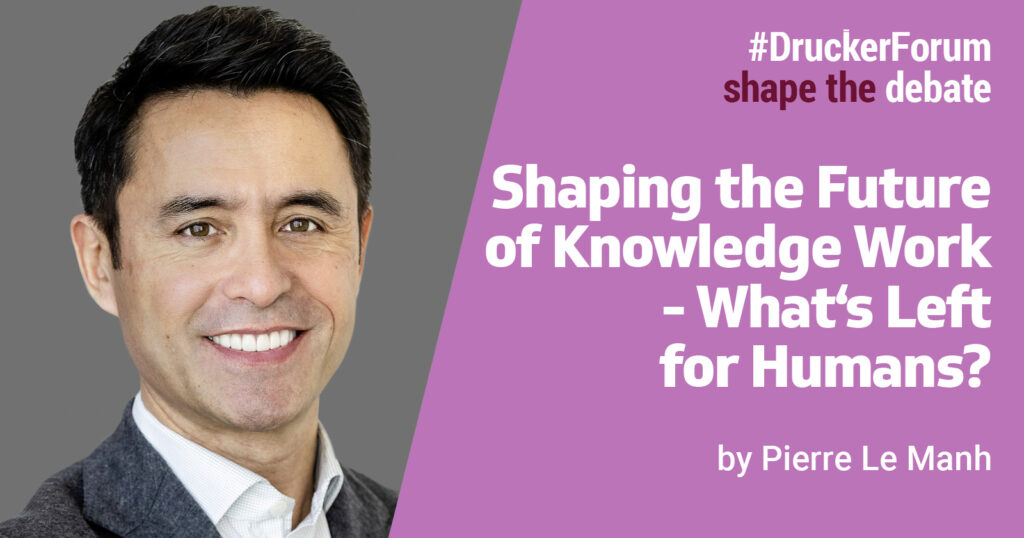
When we talk about the future of the knowledge economy, the first question that comes to mind is whether we should still call it that. Relatively soon, all knowledge, expertise, and the know-how to apply them – accelerated by the combined explosion of AI and robotics – will reside with machines.
We tend to downplay the impact of AI on work, focusing on the automation of rote tasks while humans would focus on those that demand “human qualities” like creativity and empathy. That’s comforting; it helps us overcome the fear of the potential loss of jobs. Fear is a natural reaction.
But AI is more than automation. It shifts our perception of what it means to be human and erodes our sense of human singularity. Copernicus showed us that Earth, and by extension humanity, wasn’t the center of the universe. Darwin that humans were merely evolved animals. Freud that our thoughts and behaviors are governed in part by unconscious drives. Now we have AI, a force capable of challenging what we thought was uniquely human – intelligence, creativity, even empathy.
But AI is already highly empathetic, very creative, and in many ways, very human. It even makes mistakes and can sometimes be a little lazy – contrary to our ingrained view of machines as perfect and predictable. Down the road, AI will be even more powerful, and friction in our interactions with it will go away. Voice, memory of all our interactions, maybe reading of our body language, or even of our brain waves – AI will become a seamless extension of our “knowledge.”
The productivity gains from this AI and robotics transformation will be massive. Today, work is what gives most of us the means to survive. But the productivity gains and the reduction of the need for work as we know it will force societies to rethink how most people acquire the means to live with dignity, while they focus instead on how to live a fulfilling life. People will still engage in activities, some even in rigorous work, but it will be because they want to, not because they need it to survive.
Meanwhile, we face another massive challenge that will shape our lives: the future of our planet. To secure a livable world, we must accelerate innovation to make the breakthroughs that can regenerate the planet, while embracing drastic lifestyle changes.
Among these changes, I don’t believe that traditional fixed offices, empty most of the time, are the future. Their carbon costs (including the commuting) are too high, and they create an artificial physical constraint that hampers our ability to build the diverse teams that foster innovation. Eliminating fixed offices doesn’t mean eliminating in-person connection. It means doing it differently, less frequently, but far more purposefully and meaningfully. It’s more challenging, but we can learn to excel at it.
So, what does this leave to humans? I think the reinvention of the knowledge economy – maybe soon called the purpose economy or the hyper-innovation economy – will mean that humans will find their identity in a triptych: Accountability, Ownership, and Choice. Each element is essential, and they work together as a response to the seismic shifts reshaping what it means to work, to create, to contribute. It is the responsibility of leadership to nurture them.
Accountability is not something we can escape from. No matter how advanced AI becomes, or how much we lean on it. Because in the end, it’s still on us to ensure AI is used responsibly and aligns with human values. Even deciding how much we leverage AI, or whether to use it at all, is a choice that requires accountability. Our responsibility to guide, validate, and oversee what AI produces isn’t something we can hand off. It will always come back to us. This is true for a CEO, a surgeon, a journalist – for anyone: Humans remain accountable for AI.
Ownership is about being fully invested. It makes us up our game. It derives from a sense of purpose, and gives a pride in outcomes. With ownership, people see the outcome of what they do as a reflection of who they are and what they stand for.
Choice is the fair counterpart to accountability and ownership. It is the freedom to choose our approach, our tools, the environment and the pace that works for us. Choice lets any task we engage in become an extension of ourselves, rather than something imposed. It is the power to say, ‘This is how I can best contribute.”
Accountability, Ownership, and Choice together need to be nurtured by the leaders of the post-knowledge economy. They will give humans the power to thrive, not just survive, in a radically different world – one where purpose has become what is distinctively human.
Because at the end of the day, it won’t be just about knowing more. It will be about being more.
About the author:
Pierre Le Manh is President and CEO, PMI Project Management Institute

